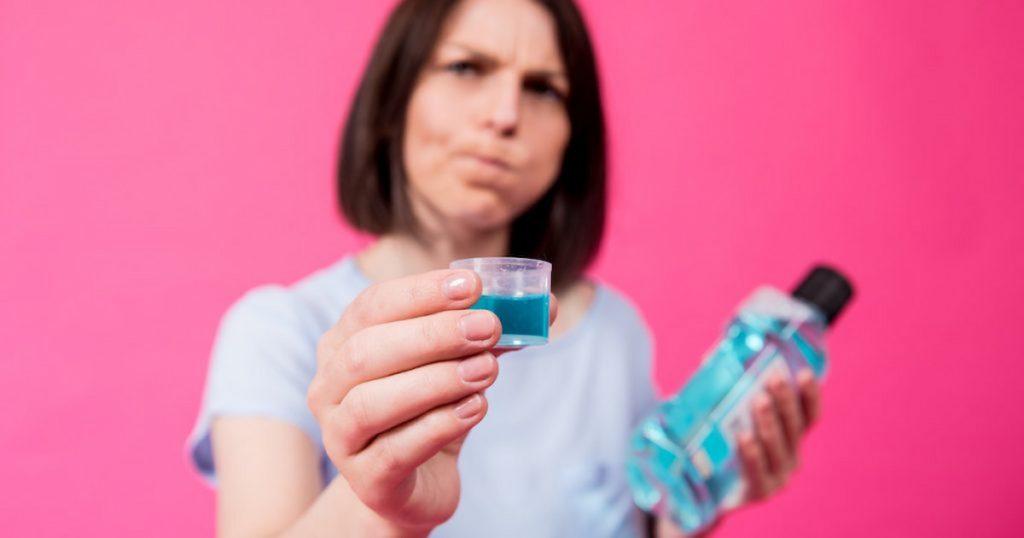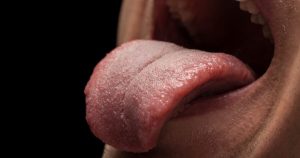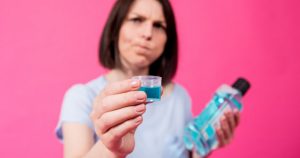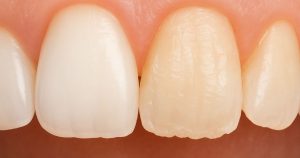Mouthwash can be a great tool in maintaining oral hygiene, helping to kill bacteria, freshen breath, and support overall dental health. But what happens if you use an expired bottle? Is it still safe? Understanding the risks associated with expired mouthwash is essential to maintaining good oral health and avoiding potential issues.
Here, we’ll cover how to recognize expired mouthwash, its risks, as well as tips from our dental hygienists for proper storage so you can keep your mouthwash effective and safe.
Does Mouthwash Expire?
Yes, like many other oral hygiene tools, mouthwash has an expiration date. This is usually marked on the bottle and represents the manufacturer’s recommendation for how long the product will stay effective and safe.
When mouthwash expires, its active ingredients undergo chemical changes that reduce effectiveness and, in some cases, pose minor risks. For example, fluoride compounds can gradually break down, decreasing their ability to strengthen enamel and prevent cavities. Chlorhexidine and essential oils may oxidize over time, losing their antibacterial potency, while hydrogen peroxide decomposes into water and oxygen, eliminating its disinfecting power.
Alcohol, which acts as a preservative, can evaporate or degrade, reducing shelf-life and allowing microbial growth. Even the flavoring agents and colorants can chemically alter, producing off smells or tastes. These reactions are accelerated by heat, light, and repeated exposure to air, making expired mouthwash less effective and potentially irritating to the mouth.
How Long Does Mouthwash Last?
Most mouthwashes last about 2 to 3 years from the manufacturing date.
- Alcohol-free or natural mouthwashes tend to expire sooner because they have fewer preservatives.
- Unopened bottles usually stay effective until the expiration date printed on the label.
- Opened bottles can start to lose effectiveness after 6 to 12 months, especially if exposed to light, heat, or air.
Cosmetic vs. Therapeutic Mouthwash Expiration
Cosmetic mouthwashes are mainly used to freshen breath and don’t contain active ingredients like fluoride or antibacterial agents. They usually last longer and are less affected by expiration. Therapeutic mouthwashes, on the other hand, include active ingredients such as fluoride, chlorhexidine, or essential oils designed to reduce plaque, fight bacteria, or prevent gum disease.
Over time, the ingredients can break down or lose their effectiveness, making expired therapeutic mouthwashes less reliable for oral health. While using an expired cosmetic mouthwash might simply be less refreshing, an expired therapeutic one could fail to protect your teeth and gums properly.
Suggested Article: What Is the Best Mouthwash for Bad Breath?
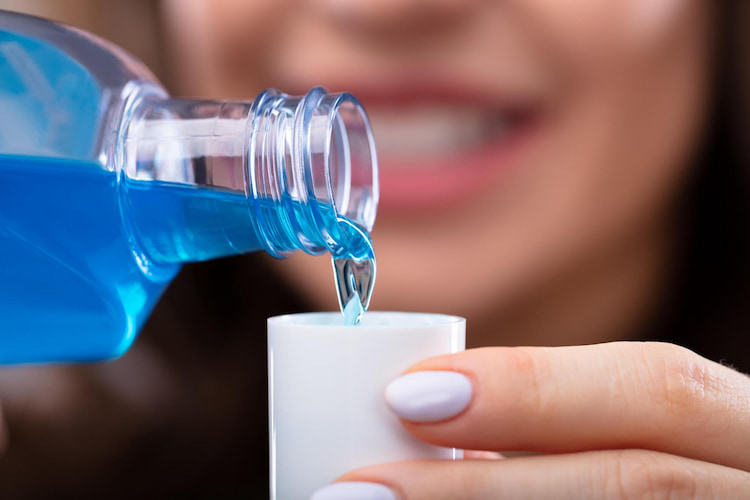
Signs of Expired Mouthwash
Expired mouthwash can often be hard to spot, as the changes may be subtle. However, sure signs can indicate when a bottle has passed its prime and should no longer be used. Paying attention to these indicators can help ensure you’re using safe and effective products to maintain your oral health.
1. Color Change
A noticeable color change is one of the most evident signs of expired mouthwash. Mouthwash usually has a specific, vibrant, fresh color, such as a bright blue or green. Over time, these colors can fade or turn cloudy as the ingredients break down. If you notice any change in color or clarity, it’s likely time to replace the bottle, as this could indicate that the active ingredients have deteriorated.
2. Unpleasant Smell
A fresh bottle of mouthwash typically has a pleasant, minty aroma. However, when it expires, you may notice a sour, medicinal, or even slightly musty odor. This smell can result from bacterial growth or chemical breakdown within the solution. If the scent of your mouthwash is off or different from when you first bought it, it’s a vital sign that it may have expired and is no longer adequate for oral hygiene.
2. Thicker or Slimier Consistency
Mouthwash should pour smoothly and have a consistency similar to water. However, an expired bottle may have a thicker, slimier texture that feels unpleasant. This texture change could indicate chemical reactions between the ingredients or bacterial contamination, which is why mouthwash with an unusual consistency is best avoided.
What Does Expired Mouthwash Taste Like?
Expired mouthwash often tastes stale, bitter, or unusually harsh compared to a fresh one. You might notice a weaker mint flavor or even a metallic or sour taste if the ingredients have started to break down.
In some cases, alcohol-free or herbal mouthwashes can develop an off or musty flavor due to bacterial growth or natural oils going bad. If the taste feels different or unpleasant, it’s best to stop using it; the change is a sign the product is no longer effective or safe.
Worth Reading: Oral Health Care Tips: Essential Tips for Healthy Teeth and Gums

What Happens If You Use Expired Mouthwash?
While using expired mouthwash may not always lead to immediate harm, it’s generally not recommended due to the following risks.
1. Reduced Effectiveness
One of the biggest concerns with expired mouthwash is its reduced effectiveness. Mouthwash typically contains active ingredients that kill bacteria and promote good breath. Over time, however, these ingredients can break down, making the mouthwash far less effective in maintaining oral health.
2. Potential for Bacterial Growth
Mouthwash contains certain preservatives to prevent bacterial growth, but they can lose effectiveness once the product expires. This may create a breeding ground for bacteria, potentially leading to more dental health issues than it prevents. Imagine using mouthwash and unknowingly introducing bacteria into your mouth, not the kind of “fresh start” you want in your daily routine!
3. Irritation and Mouth Sores
In some cases, expired mouthwash can irritate the gums, tongue, or the sensitive lining of the mouth. This may result in discomfort or even sores, particularly if the mouthwash ingredients have chemically broken down. Oral care products past their expiration date might irritate rather than soothe, making expired mouthwash a risky choice for maintaining a healthy smile.
Check out this article to make sure your oral care routine is effective: 11 Daily Oral Care Habits Recommended by Dental Hygienists
What to Do If You’ve Used Expired Mouthwash
It happens; maybe you didn’t notice the expiration date or accidentally grabbed the wrong bottle. If you’ve used expired mouthwash, don’t panic. Here’s what you can do.
- Contact your dentist: They can provide specific advice based on your symptoms and help ensure your dental health isn’t at risk.
- Monitor for symptoms: Look for symptoms like gum irritation, mouth sores, or unusual taste. While these issues aren’t guaranteed, monitoring for signs of irritation can give you peace of mind.
- Use a new bottle: Replacing your old mouthwash with a fresh bottle is the best way to keep your oral care routine safe and effective.
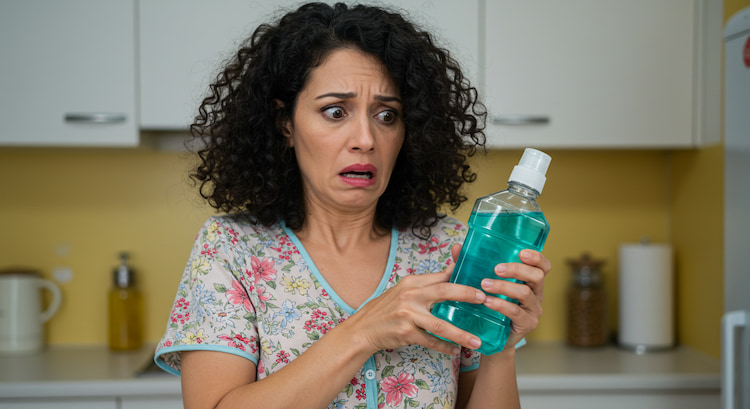
Tip: Check the expiration date before buying, and consider marking the date on the bottle to remind yourself when it’s time to replace it.
A Better Way to Keep Your Smile Healthy
Looking for ways to step up your oral hygiene routine? At Pape Dental Centre, we provide expert advice and treatments beyond daily mouthwash use. We’re here to help keep your smile shining and your mouth healthy.
Contact us today to learn more about how we can support your dental health journey!
Tips for Storing Mouthwash
Properly storing your mouthwash ensures that the active ingredients stay stable, so each rinse is safe and helpful in promoting good oral hygiene. Here are some straightforward tips to follow.
- Keep your mouthwash away from heat and sunlight, as exposure to direct light or high temperatures can break down its active ingredients.
- Store it in a cabinet away from windows and other heat sources.
- Always ensure the lid is tightly secured after each use, helping preserve the product’s quality and extending its shelf life.
- Make it a habit to check the expiration date and replace your mouthwash once it has expired.

How Should You Dispose Of Expired Mouthwash?
You can safely dispose of expired mouthwash by pouring it down the sink or toilet with plenty of running water. Most mouthwashes are water-based, so they won’t harm plumbing or the environment in small amounts.
However, if your mouthwash contains alcohol or other chemicals, avoid pouring large quantities at once. You can also check your local waste disposal guidelines for specific instructions. Make sure to rinse and recycle the plastic bottle if possible. Also, never throw full bottles in the trash, as they could leak and create a mess.
Further Reading: Common Dental Problems and How to Prevent Them
Protect Your Teeth and Gums by Avoiding Expired Mouthwash
Using expired mouthwash might not seem like a big deal, but it can make your oral care routine less effective and even cause irritation or bacterial growth. Always check the expiration date, look out for changes in smell or color, and store your mouthwash properly to make it last longer. When in doubt, it’s safest to replace it with a fresh bottle.
Your oral hygiene routine is crucial to staying healthy and feeling confident. At Pape Dental, we’re committed to helping you find the best solutions for a radiant smile. Whether you need preventive dental care, cosmetic dentistry treatments, or restorative dental services on Danforth, we’re here to guide you in every step of your dental health journey.
After all, taking a little extra care today can save you from more significant dental issues!
FAQ
-
Can you use expired mouthwash?
No, expired mouthwash can be less effective, and in some cases, it can lead to irritation or introduce bacteria into your mouth, which may affect your oral health.
-
How long does mouthwash last?
Most mouthwashes last about two to three years. Always check the expiration date to be sure.
-
How can I prevent my mouthwash from expiring?
Store it in a cool, dark place, keep the lid tightly closed, and replace it regularly to ensure it stays effective.
-
Is expired alcohol-free mouthwash more dangerous?
Expired alcohol-free mouthwash isn’t usually dangerous, but it can lose its effectiveness faster than alcohol-based types. Since it lacks alcohol, which acts as a preservative, bacteria or mold may grow more easily once the formula starts breaking down. If it smells strange, looks cloudy, or tastes off, it’s best to throw it away.
-
How long after opening is mouthwash usable?
Most mouthwashes are best used within 6 to 12 months after opening, even if the printed expiration date is later. Once opened, exposure to air, light, and temperature changes can cause ingredients to degrade more quickly.
-
Is expired alcohol-free mouthwash worse than expired alcohol mouthwash?
Yes, in most cases, expired alcohol-free mouthwash can be worse because it’s more likely to lose its antibacterial properties and develop microbial contamination. Alcohol-based mouthwash has a longer shelf life since alcohol helps preserve the product and prevent bacterial growth.
-
Does Listerine expire?
Yes, Listerine does expire. Like all mouthwashes, its active ingredients gradually lose effectiveness over time. Most Listerine bottles have an expiration date printed on the label, usually 2 to 3 years from the manufacturing date. Using it past this date won’t necessarily harm you, but it may be less effective at killing bacteria, freshening breath, or protecting your teeth and gums.
We’d love to hear from you! Have you ever used expired mouthwash or noticed changes in your oral care products? Share your experience or questions in the comments below.
